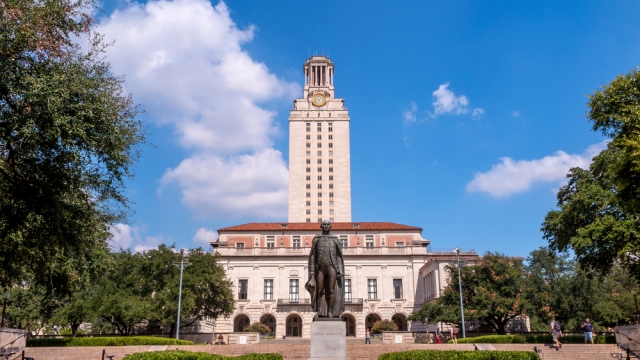Conservative lawmakers in state legislatures across the country have been challenging what they consider controversial topics in colleges and universities. But there's a new front in the academic culture wars.
"Tenure," said Texas Lt. Gov Dan Patrick in a press conference last year. "It's time that comes to an end in Texas."
Academic tenure is an indefinite appointment that can be terminated only for cause or special circumstances. Across the country, state legislatures have been trying to modify or eliminate the practice in state colleges and universities. Recently, at New College in Sarasota, Florida, the board of trustees voted 6-4 to reject tenure for five professors. Board members who voted against the faculty cited recent administrative changes at the school, saying they could reapply next year.
The vote to deny tenure drew objections from students and faculty, and one board member, Matthew Lepinski, resigned in protest.
"We might risk destabilizing programs to the detriment of our current students if we go and categorically deny tenure to people who have demonstrated loyalty to the school," said Lepinski, an associate professor of computer science.
The board's move followed a state law signed by Gov. Ron DeSantis last year that established a system to review tenured faculty and potentially fire them. DeSantis also has specifically sought to remake colleges through appointments of conservative officials and new policies.
Distrust of academia has been growing among American conservatives for years. Asked if they agree with the statement "most college professors teach liberal propaganda," 83% of Republicans polled said they agreed according to a 2022 poll by FiveThirtyEight, PerryUndem and YouGov.
SEE MORE: High school reschedules graduation after only 5 students meet criteria
Lawmakers have proposed measures to bar tenure overall or to weaken it by establishing post-tenure review, known as PTR.
"Right now, tenure, you're reviewed every six years," said Patrick at a press conference. "And whatever you do in those six years, the university can't do anything about it."
"Professors are attempting to convey their point of view and to inculcate that into the students," said Jerry Cirino, a Republican Ohio state senator and sponsor of a bill that would create a PTR process in Ohio state universities and colleges.
Weakening tenure with a new review process would have deep impacts, says Ohio State English professor Pranav Jani, the president of his state’s chapter of the American Association of University Professors.
"What PTR does is it gives broad authority for officials to call for post tenure review, first of all, and to even fire tenured faculty on the basis of politics," said Jani. "And that's really how I would regard these definitions of controversial topics, of lack of intellectual diversity. These are all political and subjective judgments that are being made on the name of freedom of thought."
Patrick's call to end tenure at Texas public universities last year came after the faculty council at the University of Texas at Austin professors spoke out against political interference in curriculum.
"This small group of professors, they voted for it 41-5, they don't understand that we in the legislature represent the people of Texas," he said. "Of course we're going to have a say in what the curriculum is."
He added that "the law will change and say teaching critical race theory is prima facie evidence of good cause for tenure revocation."
SEE MORE: 12-year-old graduates from college with 5 degrees
Defenders of tenure say weakening or eliminating the practice harms free speech and academic freedom.
"They're using a kind of attack on ethnic studies and gender studies as a wedge issue in order to bring in an attack on tenure itself and on academic freedom itself," said Jani.
Professor Roger Pielke Jr. of the University of Colorado Boulder said that tenure protects academic voices of all political stripes.
"I was investigated by Congress and attacked by the Obama White House. Academic freedom backstopped by tenure is why I survived professionally from those experiences," he wrote recently.
But conservatives say there is a limit to academic freedom, especially in institutions funded by taxpayers.
"We believe in academic freedom. But everyone has guidelines in life, everyone has barriers, everyone has boundaries," Patrick said. "
Among the various proposals, a bill to eliminate tenure outright failed recently in Florida but the Texas proposal passed the state Senate.
Trending stories at Scrippsnews.com




